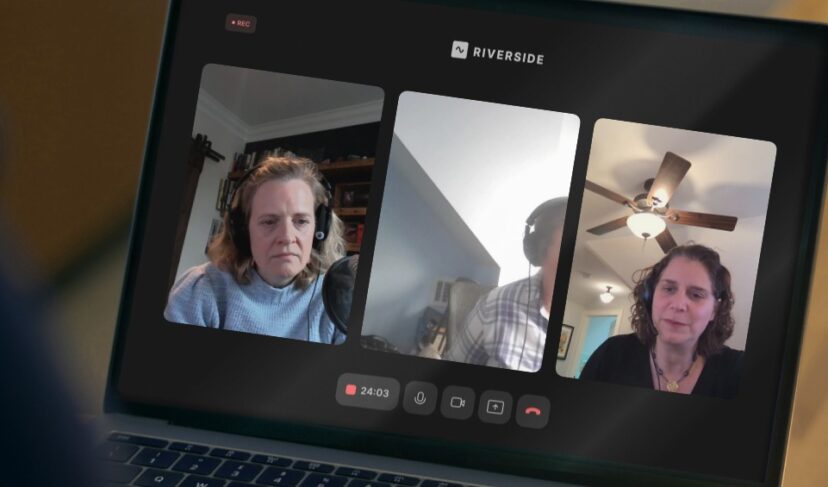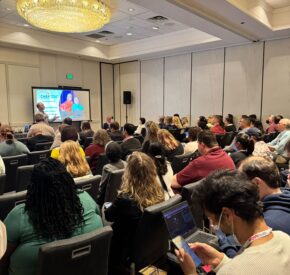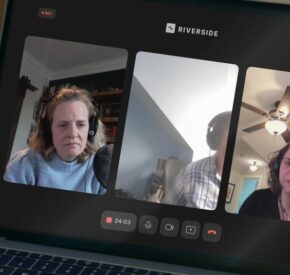Living at the Intersection: LGBTQ+ and Disability Pride
Pride and perspective from a trans, neurodiverse lens
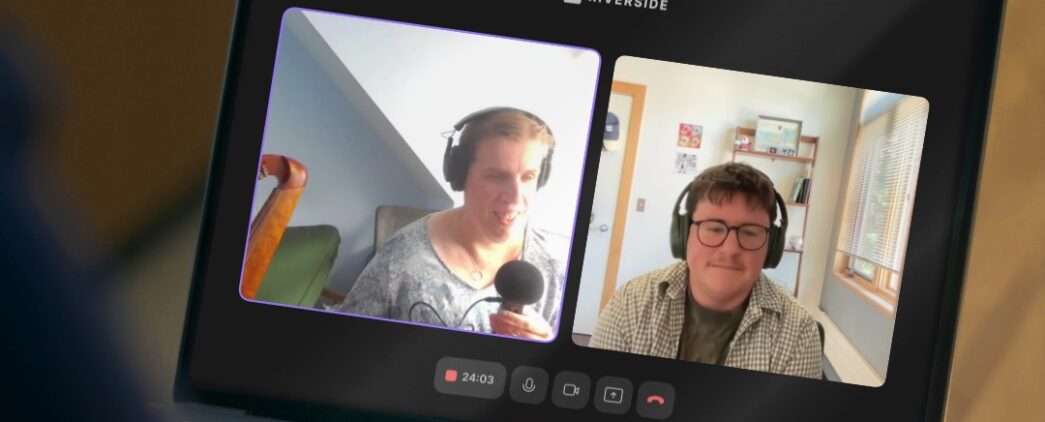
What does true inclusion look like, at work, in policy, and in community? In this powerful LGBTQ+ Pride and Disability Pride Month episode, Devon Murphy shares his journey of coming out as a trans man, navigating life with Autism and ADHD, and finding support along the way. Host Kristen Witucki and Devon also unpack the current threats to Section 504 and why standing together matters now more than ever.
Learn more about supporting people with disabilities in Tamman’s Learn Center and stay connected with us on LinkedIn.
Meet our guest:
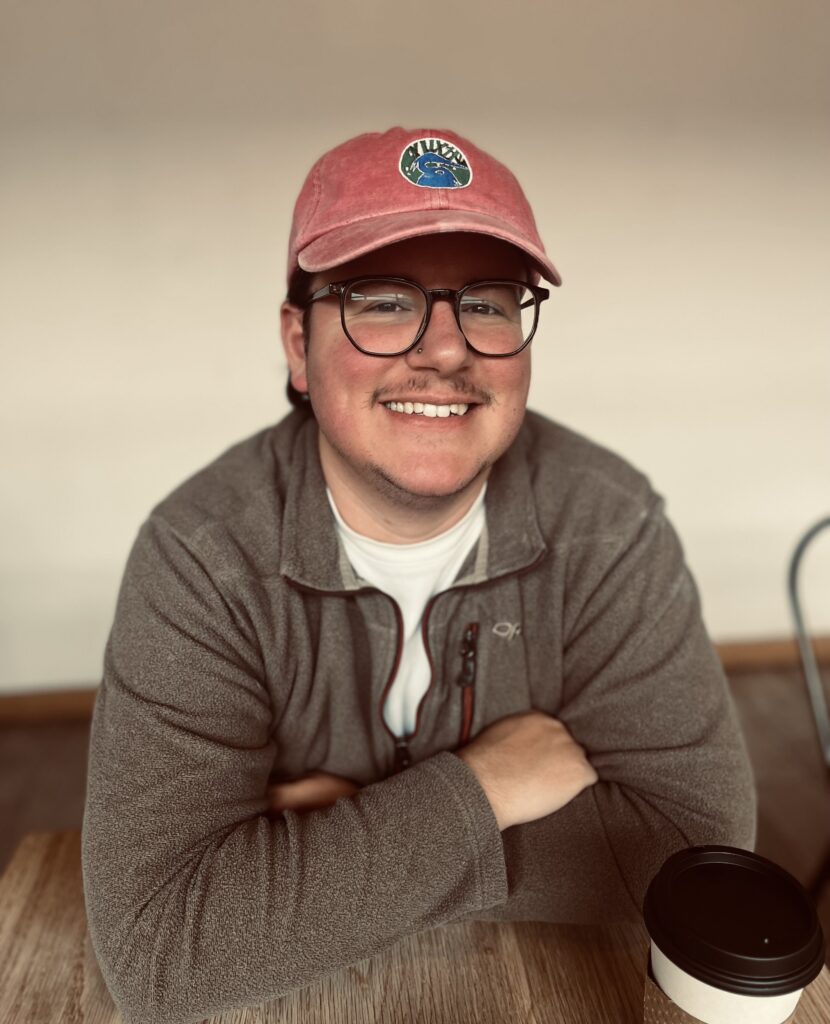
Devon Murphy is a disabled trans man and Product Owner at Tamman. Devon can usually be found in the mountains, at the rock gym, paddling in a nearby lake, or exploring the city with his dog and partner.
Listen to more Article 19 Podcast Episodes
Full Transcript
Access the PDF Transcript
Kristen Witucki:
Hi, I’m Kristen Witucki, content creator and accessibility specialist at Tamman. And I’ll be hosting our conversation today. Our voices matter. The continued advocacy for Section 504 is working sort of. In mid-May, the 17 states eased up a bit on their attack, declaring the entire law unconstitutional. Although both federal and state branches of government are still calling concepts like undue hardship into question. That we’re having these arguments 50 years after 504 and 35 years after ADA is unconscionable. One very important aspect of the fight for protecting 504 that intersects with friends in the LGBTQ community, and that is gender dysphoria. Is gender dysphoria a disability? The struggle to remove it from the updated Section 504 is, unfortunately, not just a matter of semantics. It’s a matter of protection, and it intersects with bans and the stripping of rights. These communities have fought long and hard for. Well, disability and LGBTQ plus communities have some distinct differences in our struggles, we must all stick together to ensure that every citizen of our country lives, lives of agency and dignity. June was LGBTQ Pride Month and July is Disability Pride Month. It’s a time and a season when hearing these voices is more important than ever.
Eleanor Roosevelt Recording:
Expression is one of the most powerful tools. We have a voice, a pen, a keyboard. The real change which must give to people throughout the world their human rights, must come about in the hearts of people. We must want our fellow human beings to have rights and freedom which gives them dignity. Article 19 is the voice in the room.
Kristen Witucki:
For the past four years, Devon Murphy has worked as a product owner at Tamman. Tamman, Inc.
Devon Murphy:
I work with, directly with our clients, and I essentially bridge the the gap between the client and the development team. So what that kind of looks like is, doing a lot of consulting with the client, to help them solve their business challenges through software development. I assist them with design reviews, providing feedback on UX. So user experience as well as accessibility concerns. And then I translate those needs from the client into more technical requirements that the development team can work off of. And vice versa. If there’s, questions from the development team that are more technical in nature. I will then translate that back to the client in a way that they can understand as not as technical people, as as a software developer would be.
Kristen Witucki:
To say that the past few years have been eventful ones for Devon might be one of the understatements of my career. Well, Devon was hard at work at Tamman and interfacing between our clients and developers. He was doing some hard thinking about both his queer identity and accessibility.
Kristen Witucki:
Could you describe your journey of coming out and transitioning the whole way that experience unfolded?
Devon Murphy:
Yeah, absolutely. So I grew up in the 90s. And during that time there was really zero trans representation, at least not positive representation. And really, hardly any LGBTQ plus representation in a positive light as a whole. So I really grew up just kind of feeling different, not having any idea what that meant. I eventually, after meeting some queer folks in high school, eventually, shortly after high school, I came out as a lesbian and thought that was that was just who I was for the next about ten years of my life. Because still, at that point, you know, the early 2002, 2010’s, unless you were looking for it, there really was this, but still not a lot of trans representation. Definitely not in the mainstream media and on social media. It was kind of still in a place where you had to really know to look for it in order to find it. It wasn’t really coming to you in any way. So I spent the last, you know, that those ten years just really still not feel like super comfortable in my identity. Started dressing more masculine. Thought I was just a masculine-presenting lesbian for a long time. And that still didn’t really feel fully right. But I could never really tell if I was just not comfortable with myself or what exactly it was. Eventually, I started seeing. TikToks of trans men, and I was like, what if it is this because, I mean, being trans in the media was so rare, but the only time at least I ever saw it, it was trans women. And I truly didn’t think I realized that there was such thing as a trans man until I started seeing TikToks, and I just was like, wow. Like, there’s this whole community of people, and like, they’re telling their stories, and I’m hearing their experiences and I’m just like, kind of felt like a smack in the face of like, this feels so exactly how I feel deep inside. And then, of course, I went through the whole denial phase of, no, no, that’s not me. That’s not me. I’m just a masculine lesbian. It’s fine. I remember the summer before I really kind of admitted to myself that I was trans. I was talking to, my sister, my cousin, and I said something along the lines of, yeah, if I cared about pronouns, I. I think I would be trans. And like, I think about that now and I’m like, what a wild thing to say. Like, if I cared about pronouns, I would be trans and that’s kind of turned into a joke in my family now. Like, oh, care about pronouns? So a few months after that happened, I found a therapist who specialized in, gender identity. And after talking with her, quite a few times, doing some more research, continuing to see other trans men listen to their stories. I finally was able to say it out loud like, this is me. And, I think it was just this, like, huge weight off my shoulders and that moment of like, finally coming into myself and like realizing like, this has been who I am all along. And I was such an explanation of like, just this uneasy feeling I had so deep inside of me for so long. And it was just relieving. And then I just kind of never looked back and started coming out to everyone.
Kristen Witucki:
Once Devon knew in his bones he was a man. The realization led him to his new name. His mother, who died nine years ago, had wanted to name him Devon at birth, but his father had dismissed the name as too masculine. As Devon says, she knew his name all along. In honor of her wisdom, he used her middle name, Joe, as his own.
Kristen Witucki:
How did Tamman support you during that transitional period?
Devon Murphy:
I would say that Tamman was and I’m not just saying this because I’m on a Tamman podcast. Tamman was incredible in my transition. There was immediate like my first step. I met with HR, told our our, told our HR about it, and they pulled in Marty, and it was just immediate acceptance and support. There was not a moment in time when I was even worried that I’d get anything else from happening. And then Marty wrote a long message to all of Tamman, and I just think that even the way it was worded, it was so much like just introducing me as Devon, clarifying my pronouns. And there was just never any question of like, even feeling like they didn’t like he didn’t understand transness and was approaching like I never had to correct his approach. Like it was just very smooth. And I really appreciated that because I think that, like transness often is this taboo topic that people are very afraid to even touch and and speak on because they’re very afraid to say the wrong thing. And I just his willingness to just really kind of just be like, yep, I accept you. I support you. Like, here’s how I’m telling everyone. And it was just so seamless. It felt like, and then just the immediate jumping into action to change my name and everywhere possible. And the acknowledgment when because I don’t have my name changed legally yet. So some of the more like health insurance, payroll documents still have my previous name on them. And just then, like kind of acknowledging that at the forefront and being like, hey, I’m changing it everywhere. I can’t do it here. So you’ll unfortunately have to see it. And like just kind of that care that was put into that entire process. Yeah. It was it was just more than I would have expected from any company. So it was it was great. It’s a nice surprise.
Kristen Witucki:
Oh. That’s awesome. What role did your family and friends play in supporting your transition?
Devon Murphy:
Yeah. So I’ll say that my fiancée, my sister, I think, have played the biggest role in supporting my transition. Don’t get me wrong. My whole family has been supportive and welcoming. But I need to call out my fiancée and sister specifically. So my fiancée still. I mean, I’m on year three now of medically transitioning and socially transitioning. She still goes to all of my doctor’s appointments with me. Making sure that there’s no funny business going on back there. She also reminds me every week to take my HRT, which is the my hormone replacement therapy. Which is something that, after three years doing a shot once a week is very easy to forget, especially once your physical changes start kicking in and you’re not constantly thinking about, like, when will my mustache come out? I’m like, it’s here and now. Sometimes I just completely forget about it. She’s been so helpful in reminding me. And also just being an incredibly vocal ally for the trans community as a whole. My fiancée came into this, like, pretty well educated, trans people. So she was just someone that really was able to help guide me through a lot of things that were scary, and while not having to also educate her on them while I’m going through them. And my sister specifically, she truly took the time to educate herself, so that she can support me in the best way possible. I think when I first came out, it was such a new thing to her where she knew that trans people existed, but knew next to nothing about what that meant, and instead of bombarding me with questions while I’m going through this major life change. She really kind of silently went and educated herself and like, found good resources, is took the time and has really grown into this ally that I now have who has learned clearly, learned so much, but doesn’t show about it, has never told me, oh, I’ve done all this research. Like I can just tell by the way she speaks about things that she’s grown so much. Umm, and it’s just been really special. I’m grateful to have all that support and these people that take that time out of their day to really kind of learn about who I am so they can better support me.
Kristen Witucki:
That’s awesome. How does Tamman currently demonstrate its support for Pride Month and LGBTQ plus inclusion?
Devon Murphy:
Great question. We currently have a group of folks at Tamman, who volunteer to coordinate our Pride Month activities each year. So those are typically things like multiple Slack posts a week that will either highlight LGBTQ plus figures, current issues, advocacy, and action, as well as LGBTQ plus media. We do coffee talks that focus on LGBTQ plus topics, blog posts focusing on Pride, and in-person meetups when possible to celebrate. I’ll say that LGBTQ plus inclusion and inclusion as a whole is truly at the heart, of, who Tamman is as a company. I think Tamman truly does meet you where you are and will support you along the way. And I think that that goes well beyond our leadership. Often you’ll see leadership in a company that is inclusive and supportive, but that doesn’t always trickle down to the staff of that company. And I think that here it does. I think that we have an incredibly inclusive and supportive group of people that work at Taman. We all have different experiences and I’m sure different opinions on things, but I have never once felt unsupported or not included by anyone working at Tamman. And it’s just very obvious in the way people interact with each other that there’s just this genuine respect amongst, uh amongst our peers.
Kristen Witucki:
Yeah, definitely. I feel the same way.
Devon Murphy:
Yeah, for sure. We’re good at we’re good at picking, picking the good ones around here.
Kristen Witucki:
Once Devon embraced his trans identity more fully, he began to understand that it wasn’t just his gender that he had not fully understood. It was also the way his mind worked that it could be classified and worked with instead of against. And that aspects of his personality that he previously considered shortcomings weren’t his fault.
Kristen Witucki:
Can you describe what it was like when you first learned or recognized that you have Autism and ADHD?
Devon Murphy:
Absolutely. So I learned pretty, I guess, considerably late in life. It’s only been over the past 2 to 3 years that I have had a diagnosis. I think that I had done some pretty extensive research on both autism and ADHD before reaching that diagnosis point. So I think that, throughout the majority of my life. So, especially as a young kid in, you know, elementary school, middle school age, when you’re kind of watching your peers really start to figure themselves out and gain these large friend groups, I always felt pretty left behind in those spaces. I found myself struggling to pay attention in class, and also just really struggling to connect with people. I think that throughout my life, I just thought I was extremely shy and a bit lazy when it came to schoolwork. And that was really challenging to focus on schoolwork when I have all these other kind of thoughts going through my mind of am I participating in society in the quote correct way? And I think I kind of chalked it up to just, oh, school’s just not for me. I’m just shy. I’ll never have, you know, a friend group, and that’s just okay. And I think as I got older and I was no longer in a school environment, and I got into my professional career and realized that a lot of those same struggles were still happening. I continued to kind of try to make excuses that were my fault of why those were happening, and it just kind of ended up with a lot of turnaround in my career. So I’ve done many different things in my career before landing in technology. I’ve done retail, I worked in the medical field, and just everything kind of ended in the same way where I felt like I would get really behind on tasks, not able to catch up, and then kind of just be faced with this complete, overwhelming feeling that I couldn’t get out of. Umm and many companies aren’t really helpful in those situations. I think it kind of the first reaction is being reprimanded. And that you’re a bad employee or you’re wrong instead of kind of helping to accommodate and figure out, like, how can we help this person complete the tasks and in a way that works for them? And I think through that, like I really started to dig in and like, think about, like there’s something going on here and like, I don’t think it’s just that I’m inherently lazy, or inherently unorganized or inherently unable to, like, maintain friendships. Like, there has to be something else because I don’t feel lazy, like it feels like I physically can’t do these things. In the way that everybody else is doing them. So I started researching, and honestly, I think social media played a big part in, in it. Like, you see, you start to see TikToks of people being like, here’s how I got an autism diagnosis, or here’s how I got an ADHD diagnosis. And, to say I’m not advocating diagnosing yourself via TikTok. there is a criteria that you need to meet to have a diagnosis. And I did do some quite a bit of research and I was like, you know, like these things really, really align with the way it feels in my brain and the way I felt throughout my life.
Devon Murphy:
And I actually kind of got the diagnosis in a little bit of a roundabout way. I was getting a, working to get a diagnosis for ADHD through a psychiatrist, and they had both me and my fiancé take assessments on, just how I am and the things I do and the way I do them. And funnily enough, my assessment came back as like 100% ADHD. But the assessment my fiancee took was much more leaning toward autism. And that kind of started the larger conversation of like, okay, like it could be one, it could be the other, it could be both. And it eventually landed on both. And I think that by the time I got that diagnosis, and that kind of validation medically of like, yes, this is this is you like, you do have autism and ADHD. I think I had done so much research that it felt I felt relieved by that point. I think, because I spent so much of my life either feeling so far behind everybody else or masking. So I kind of just portrayed myself in a way that I thought was quote “the correct way”. That I was just exhausted and felt like I had nothing to show for it. So it was definitely a relief for me to kind of get that diagnosis and be able to finally start to, like, understand who I am and how I can show up in a in the world in a healthy way for me.
Kristen Witucki:
How has Tamman supported you as an employee with non-apparent disabilities?
Devon Murphy:
So I haven’t requested any specific, accommodations or support from Tamman, but I think that Tamman as a company has just kind of naturally given me accommodations that I didn’t have to ask for. Just from their policies alone. So, meaning, like our, our remote work model. So we can all work from wherever, whatever location works best for us. Which was something that I didn’t realize was so huge for me until kind of after I got my diagnosis and realizing I was able to realize how overstimulating an office environment is for me. So having that ability to work remote and being told as well, hey, we’re never going to go back to the office like, this is not something where we’re pulling a fast one on you one day and saying, we all have to go back in, like, you work from home and that’s where you work. I think that is something that’s been incredibly helpful for me. Our flexible scheduling. So if I have a doctor’s appointment or, you know, I’m just feeling overwhelmed and I don’t have meetings, and I want to take a couple hours to step back and come back later in the in the evening to make up that time. You know, having that flexibility is really helpful. I think especially with my autism, some days I’m just my sensory is so heightened, that it can get challenging to focus on anything. So like being able to have that break and the ability to take that break is, uh, incredibly helpful. And then, just having the freedom to have our cameras on and off when, when we need to in meetings, like, there’s not this hard line requirement to have your camera on in meetings at all times. Which is helpful for those, like high sensory days. And then I think just as well, I noticed that our company events, they started having low sensory rooms for people who need to decompress. And just, I think, generally feeling comfortable to ask for more support if needed. I know that if there was an accommodation that I think would help me, you know, do my job better or make me more comfortable at work that Tamman, would be more than happy to hear me out and talk through options on that.
Kristen Witucki:
Devon, as an individual and Tamman as a company experienced parallel journeys as they figured out accessibility and inclusion. As an adult, Devon learned both who he was and how he functions best, professionally and socially. And Tamman, as a company, figured out the many ways to show up for marginalized communities. But it was after Devon became comfortable with all facets of his identity that his emancipation could happen. Tamman is a dedicated virtual company, so Devon could try out that feature by moving across the country to continue to find himself.
Kristen Witucki:
So, beyond your professional life, you know, what hobbies or passions do you have?
Devon Murphy
Yeah. So I actually it’s actually funny because I used to consider myself somebody who didn’t have a lot of hobbies. And recently, over the past six months, I moved out west. I was born and raised in Pennsylvania and I am now out in Oregon, with my fiancé and our dog, Frankie. And since moving out here, I have really kind of dug in. And now, for seemingly the first time in my life, have multiple hobbies, which has been really fun and exciting. So doing a lot of outdoor stuff, I mean, the Pacific Northwest has so much to offer, in that category. So I’ve been doing a ton of hiking, now that the weather’s a bit warmer. Doing some kayaking and paddle boarding. I’ve also recently gotten into rock climbing. Joined a rock climbing gym a few months ago and have absolutely fallen in love with it. I didn’t think I was in shape enough to do rock climbing until I tried it. And, it’s been a fun challenge. And it’s just, a really welcoming community, and I can’t say enough good things about it. I think that now that I’m out in Portland, there are just a ton of LGBTQ+ groups, for all of these things, all of these hobbies thing, that’s been a huge factor into getting me to start doing things. Like, I’ve also taken back, taking skateboarding back up, which was something I enjoyed in middle school. So 20 years ago now. Yeah. And, I found a trans inclusive group for skateboarding, and it’s just been, fun and nostalgic, and it’s been great.
Kristen Witucki:
So you’re someone who lives at the intersection of queer identity and disability. And, I mean, really, you’ve had a very eventful three years in figuring that out. So how do you interpret the recent attacks on 504 and just disability rights in general?
Devon Murphy:
The newer messaging of, well, we don’t want 504 to go away, but we just want gender dysphoria to be removed from 504. They’re essentially saying, we believe that most disabilities are valid, just not this one. And I think that causes a lot of problems and can of course be a domino effect. So if they’re able to pick and choose which disabilities are valid and should be covered under section 504, they likely won’t stop at gender dysphoria and they’ll likely continue to impact more and more communities. I think that the saying none of us are free until all of us are free is very applicable here, because they never stop at one group. It always continues to push the envelope and see how far we can go. And I think that it just shows how important it is for us to stand with each other instead of against each other. And I think also that trans people are also disabled, and disabled people are also trans. So no matter what the blend, that intersection is really important here as well, because people are going to be greatly impacted in both communities as they, as they merge so commonly, I think what’s especially worrisome for me is, the continued use of the term gender ideology when referencing trans people. So I was I was reading a few articles about the, the lawsuit on section 504r, and then this kind of shift back to saying, well, we just want to get rid of gender dysphoria. And I pulled a quote from, the Texas attorney general, Ken Paxton, who said the Biden administration is once again abusing executive action to sidestep federal law enforce, unscientific, unfounded gender ideology onto the public. First, that could not be further than the truth. Gender dysphoria is listed in the DSM5, and many major, major medical organizations like the American Academy of Pediatrics, American Medical Association, American Psychiatric Association affirm that, gender dysphoria is real and that the suggested treatment for gender dysphoria is gender affirming care. So it is scientific and it has been studied and trans people are not new. We are not new to society. We’re not new to the United States. We’ve always been here. And I think additionally, the term gender ideology, all it does is dehumanize us because we are trans people. We’re not an ideology. We’re not a thought process. We’re not a belief system. We’re human beings. And I think it takes away from that and makes it a lot easier for people to ignore the impact these laws and challenges have on real life human beings that just live amongst them in society.
Kristen Witucki:
I really wanted to know, is gender dysphoria actually a disability? Not because people who transition don’t deserve care, but kind of a different angle. If society was better designed in general, could there ever be a time when gender dysphoria might not be dysphoria, but a natural variation of the human experience? Devon’s answer to that question indicated that while maybe there could be hope for a better designed society at some point, as a country, we’re still too far away, too dependent on the medical model to go there yet.
Devon Murphy:
I think that right now it’s important to be when we talk about with each other. I think that first, of course, listening to people of all experiences and lifting up the voices of those, especially with intersex identities. I think it’s really important to hear what people are saying. I think sometimes, we get into this kind of cycle of of listening, but not always hearing it, not hearing them fully and shifting our mindset to, include different experiences. I think that and of course, getting involved, donating when, when possible, joining a protest and possible reaching out to your state and local level politicians and disrupting the narrative that they are trying to place on us. And that could just be at your dinner table in side conversations in the community. When you hear something that is problematic, just these little interactions, disrupting them and, you know, bringing the facts out and, you know, steering people into the right direction. And I think supporting each other right now is also like just being gentle with one another. I think that even outside of the trans and disabled community, there are so many groups who are just under attack in this country right now, and everybody is connected to somebody who is afraid and afraid for their life, afraid for their livelihoods, their safety and just being gentle with people. I think that not everyone’s going to be able to show up in the same way that they usually are right now, because there’s so much heaviness in the world. And just being able to meet people where they’re at and, allowing for time for rest and just being kind.
Kristen Witucki:
Our guest today was Devon Murphy. Our producer was Bradley Marks. Support also came from Katie Samson, Sydney Bromfield, Steve Levine, Lena Marchese, Hunter McGinnis, and Marty Molloy. I am your host, Kristen Witucki.
Kristen Witucki:
Article 19 is a call for others to join us in a bigger conversation around the ADA, digital accessibility, and access to information. At Tamman and Chax, we’re working to build the inclusive web every day. And to do that, it takes all of us, working together and learning together. Until next time, thank you so much for listening. Take care.
Show Notes
- HHS Section 504: The official rule for Section 504 including the 2024 update
- Protect 504: Article 19 episode exploring the lawsuit questioning Section 504
- DREDF Protect 504: An informative overview of the lawsuit questioning Section 504

